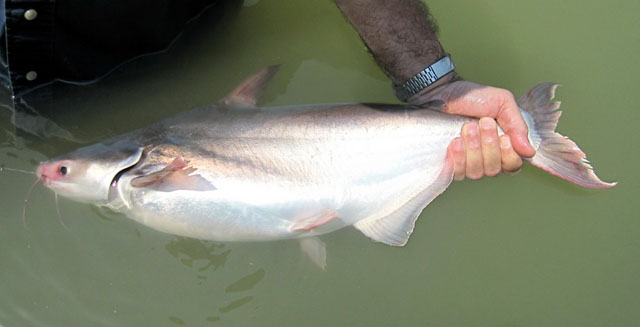| Pangasiidae (Shark catfishes) |
| 120 cm SL (male/unsexed) |
|
benthopelagic; freshwater, potamodromous |
| Asia: Mekong, Bangpakong, and Chao Phraya basins. |
|
Anal soft rays: 25-30. Dorsum dull grey with pale green iridescence; maxillary band of teeth forms a continuous row with no break in midline (Ref. 12693). Snout protruding with upper jaw tooth bands partly exposed when mouth is closed; large median vomerine tooth plate (Ref. 43281). |
| Occurs in large rivers (Ref. 12693) and enters flooded forests (Ref. 9497). Found in rapids and in deep slow reaches (Ref. 37771). Juveniles feed on prawns and insects; subadults and adults on prawns, insects and particularly mollusks which are more predominant in stomach contents than in any other Pangasius species (Ref. 7432) and on plants (Ref. 9497). Migrates into the middle Mekong along the Thai-Lao border as water levels and turbidity begin to increase. Reproduces early in the flood season and juveniles of 6 to 7 cm are taken by late June (Ref. 12693). Marketed fresh (Ref. 12693). |
|
Least Concern (LC); Date assessed: 19 January 2011 Ref. (130435)
|
| harmless |
Source and more info: www.fishbase.org. For personal, classroom, and other internal use only. Not for publication.
